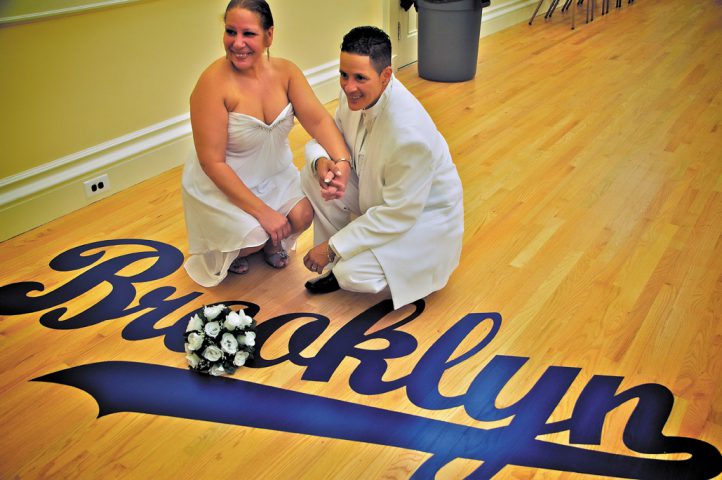In Congress and State Legislatures
However you slice it, 2011 was a transformative year for marriage.
We began 2011 with President Obama and Attorney General Eric Holder determining that, under the Constitution, courts must review discrimination against gay people—in marriage and everything else—with a heightened level of scrutiny. Discrimination based on sexual orientation must not be assumed, but rather, should be presumed unconstitutional. Obama announced that the Department of Justice could no longer defend the so-called Defense of Marriage Act (DOMA) in court. Aware of how indefensible the denial of marriage equality has become, even among young Evangelicals and Republicans, some opponents had rare moments of revealing candor. In an interview in the June 4, 2011 issue of World Magazine, Jim Daly, President and CEO of Focus on the Family, a leading funder of anti-gay attacks, declared that the opponents of equality have “probably lost” on marriage. He opined, “We’re losing on that one, especially among the 20- and 30-somethings: 65 to 70 percent of them favor same-sex marriage. I don’t know if that’s going to change with a little more age—demographers would say probably not. We’ve probably lost that.”
Momentum toward equality was reflected not just in growing public support and some cracks in the opposition, but on the ground and in the lives of families. We won the freedom to marry in New York on June 24 with the leadership of New York Governor Andrew Cuomo; the bravery of four Republican legislators who voted their consciences; and the tireless advocacy of New Yorkers United for Marriage (the coalition of Empire State Pride Agenda, Freedom to Marry, Human Rights Campaign, Log Cabin Republicans and Marriage Equality New York). The first couples married a month later throughout the state. With marriage a reality in New York, the number of Americans living in a state with marriage equality more than doubled, from 16 million to more than 35 million.
At press time, the legislature in Washington State voted to pass a bill legalizing same-sex marriage, making it the seventh state to offer marriage equality for all. The bill now goes to Gov. Christine Gregoire, who has said she will sign it into law.
Let us not forget our nation’s largest employer, the U.S. military. With the end of “Don’t Ask, Don’t Tell,” gay and lesbian servicemembers can now share in the freedom to marry at the state level. But because of DOMA, these brave women and men continue to serve our nation without the critical protections that only marriage provides.
Meanwhile, back in D.C., the President endorsed Freedom to Marry’s Respect for Marriage Act—the bill that would repeal DOMA—in July. At the first congressional hearings on dumping DOMA, Freedom to Marry provided powerful testimony both from its founder and President, Evan Wolfson, and from Ron Wallen, who was denied Social Security survivor benefits when his husband and partner of 58 years passed away last year. Following this testimony, the Committee voted on the bill, putting all of the Democrats on record as favoring the end of DOMA.
But the Dems aren’t the only ones supporting marriage on the Hill. Working with Log Cabin Republicans, Freedom to Marry secured the Respect for Marriage Act’s first Republican co-sponsor, Rep. Ileana Ros-Lehtinen. She joined a growing number of prominent Republicans to support the freedom to marry. In 2011, Freedom to Marry commissioned a bipartisan analysis by Democratic and Republican pollsters that found that with gains in support across every age group and demographic category, the momentum for marriage continues to grow at a rapid pace, even among those formerly solidly opposed. Marriage is now a winning issue not just personally, but politically.
In the Courts
People marry for many different reasons. For Dawn and Jen, an Iowa couple who in 2005 had been together for almost 16 years, protecting their young daughters was their motivation. It came down to this: government should not tell their children that their family is worth less than other families.
Thanks to Dawn and Jen and other Iowa couples in Lambda Legal’s landmark case in 2009, Varnum v. Brien, Iowa became the third state in the country to permit same-sex couples to marry, after Massachusetts and Connecticut. Today, seven states and the District of Columbia issue marriage licenses to same-sex couples, and the legislatures in several additional states are poised to consider marriage bills this year.
Thousands of same-sex couples also remain validly married in California despite passage of Proposition 8, which stripped away the freedom to marry in California in 2008.
But on February 7, the Ninth Circuit Court of Appeals upheld a lower court ruling that decreed Proposition 8 unconstitutional. The three-judge panel, in a 2-1 decision, ruled in Perry v. Brown that prohibiting same-sex couples from marrying violates the Fourteenth Amendment of the U.S. Constitution.
“All that Proposition 8 accomplished was to take away from same-sex couples the right to be granted marriage licenses and thus legally to use the designation of ‘marriage,’ which symbolizes state legitimization and societal recognition of their committed relationships. Proposition 8 serves no purpose, and has no effect, other than to lessen the status and human dignity of gays and lesbians in California, and to officially classify their relationships and families as inferior to those of opposite-sex couples,” wrote Judge Stephen Reinhardt in the majority opinion.
A stay was imposed on same-sex marriages in anticipation of future appeals, so couples will not immediately be able to marry. Opponents are expected to continue the appeals process all the way to the U.S. Supreme Court.
Keep an eye on Lambda Legal’s New Jersey suit, Garden State Equality, et al. v. Dow, which argues that both the state and federal constitutions guarantee the equal right to marry. The case was filed in June 2011 and in November the trial court rejected the State’s attempt to dismiss it. The group is preparing for a trial at the end of this year or early next year.
The federal government also continues to discriminate against these families as a result of DOMA. As this article goes to press, a handful of closely-watched lawsuits challenging the constitutionality of DOMA move forward in federal courts around the country.
The cases farthest along are Gill v. Office of Personnel Management, brought by Gay & Lesbian Advocates and defenders (GLAD), an LGBT legal organization; and a related case, Massachusetts v. HHS, brought by the Attorney General of Massachusetts. After dramatic trial court victories, these cases currently await decision from the United States Court of Appeals for the First Circuit.
Golinski v. United States Office of Personnel Management is Lambda Legal’s case on behalf of Karen Golinski, a federal employee who was denied spousal health benefits. On December 16, 2011, a trial court heard oral arguments and a decision is expected at any moment.
“We feel honored and a bit overwhelmed to be part of this movement that is challenging DOMA,” said Golinski. “When we talk to people about our case, it seems so simple and unfair.”
Pederson v. Office of Personnel Management is another case filed by GLAD on behalf of five same-sex couples and one widower from the states of Connecticut, Vermont and New Hampshire. All of the plaintiffs were denied crucial federal protections solely because of DOMA. In this case, too, a decision is pending in a trial court. A similar case brought by the American Civil Liberties Union (ACLU), Windsor v. United States, is before a federal trial court in New York.
“DOMA must fall. In 1996, when Congress passed DOMA, the stated goal was to harm gay people and same-sex families with this law, and sadly, it has succeeded,” said Mary L. Bonauto, Civil Rights Project Director for GLAD. “Every day that DOMA stands, it arbitrarily divides married couples into two categories.”
We have every reason to be optimistic about these cases. Last year, the Obama administration concluded that DOMA was unconstitutional and indefensible. It is a big step forward to see the Department of Justice making the same arguments that LGBT legal organizations have been making on behalf of their clients for years.
What’s Next for 2012
Several states have already launched efforts to legalize same-sex marriage in 2012, citing New York’s progress as a catalyst.
Maryland may reprise its role as a marriage equality battleground. In 2011, the Free State’s Senate passed a measure legalizing same-sex marriage, but the bill faced resistance in the House of Delegates. Lawmakers removed the bill from the floor when expected votes didn’t materialize.
This year, marriage proponents have the full support of Gov. Martin O’Malley as well as support in the Senate. Marylanders for Marriage Equality, comprised of progressive organizations, may be gearing up to target the biggest local constituency opposed to marriage equality: religious African-Americans. Last November, former NAACP chairman Julian Bond came out in favor of marriage in a video released by the Human Rights Campaign, a not-so-subtle message that LGBT rights are civil rights.
Democratic lawmakers in New Jersey introduced a new bill legalizing same-sex marriage on the first day of the session this January and vowed to make its passage a priority. New Jersey legalized civil unions in 2006, though a subsequent gay marriage bill failed to gain enough votes to pass in 2010. Both Senate President Stephen Sweeney and Assembly Speaker Sheila Oliver support the bill, which needs 21 votes to pass the Senate.
Republican Gov. Chris Christie has promised to veto a same-sex marriage bill if it crossed his desk, though the Senate and Assembly could override that decision with support from two-thirds of each house. “It’s gonna be a fight. We expect it to be a fight,’’ Sweeney said at a press conference.
Voters in Maine will have the chance to extend marriage rights to gays and lesbians come November. If the ballot measure passes, Maine will become the first state in which same-sex marriage is legalized by the public, rather than through state legislatures or the courts.
Though voters shot down a marriage equality bill in 2009 by a margin of 53 percent to 47 percent, advocates believe they have a better chance in 2012 based on more than 100,000 signatures—twice as many as necessary—collected on a petition to place the measure on the ballot. “All this leads us to believe that 2012 is a very different year for us than 2009,” Betsy Smith, executive director of EqualityMaine, told Bloomberg News.
The outlook is not so rosy in other areas. Two states—North Carolina and Minnesota—will ask voters to ban same-sex marriage when they vote in elections in May and November, respectively. Last year, both legislatures passed bills allowing ballot measures that would define marriage as between one man and one woman in the state constitutions.
Finally, in a cruel twist, lawmakers in New Hampshire—who legalized same-sex marriage in 2009—may vote on a bill that would repeal it. Both houses of the state legislature are controlled by Republicans, but not all support the proposal. Governor John Lynch, a Democrat who signed the original marriage bill into law in 2009, will veto repeal legislation.
Despite these challenges, we should feel proud of how far we’ve come. Less than a decade ago, 13 states criminalized same-sex relationships. Lesbians and gay men were expelled from the military. And no state permitted couples such as Jen and Dawn to marry. We should thank the brave families and organizations who have moved the country so far, so fast.
Jacqueline Yodashkin is the Communications Director of Freedom to Marry (freedomtomarry.org). Camilla Taylor is the Marriage Project Director for Lambda Legal (lambdalegal.org).





What Do You Think?